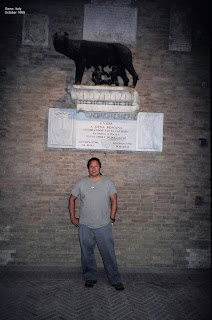 |
| Siena: nestled in the Tuscan hills |
I stepped off the train and was unsettled by the peace and quiet. It was quite a contrast from noisy Florence with its fleet of yammering scooters, its hustle and bustle, its cacophony of exotic languages, its dazzling displays of human artistic achievement. Oh, yes . . . I had almost forgotten . . . there is peace; there is quiet contemplation and uncelebrated beauty. Siena.
 |
| Author beneath a depiction of Remus and Romulus with their adoptive mother |
At the center of the city is the Torre del Mangia, "the Tower of the Eater," twenty-some years in the building, from 1325 to 1348, at the height of Siena's power. At that time, Siena and Florence were rival cities vying for cultural and financial primacy. But no sooner had the tower been completed than came the Black Death. Merciless as she was, her malice fell especially on Siena where four out of five Sienese fell victim to her.
 |
| The Piazza del Campo viewed from atop the Torre del Mangia |
I climbed to the top of the tower and looked out on the Tuscan landscape as the sun began its descent. It was a long climb up a crooked stone stairwell where I often had to stoop to avoid bumping my head. Men were shorter in those days.
As dusk deepened, the singing of young people in the Piazza del Campo below drifted up. I was stricken by the magic inherent in the Tuscan hills.
 |
| Labyrinthine Siena |
Eventually I descended to wander about some more in the warm night. Alone and thousands of miles from home, still wrestling with questions about identity, about my future, about my past, and about my relationships with those whom I loved.
But that was a gentle night in Tuscany. The hazards posed by such introspection were softened by the singing of Italian youngsters and the magic of dusk. Dusk in Siena.
To be continued...
- Pt. I Amsterdam - Arnhem - Copenhagen
- Pt. II Copenhagen - Oslo
- Pt. III Bergen
- Pt. IV Flam fjord - Goteborg
- Pt. V Stockholm - Gavle - Stockholm
- Pt. VI Berlin
- Pt. VII Prague
- Pt. VIII Budapest
- Pt. IX Vienna
- Pt. X Munich
- Pt. XI Salzberg - Innsbruck
- Pt. XII Venice - Florence
- Pt. XIII Siena
- Pt. XIV Rome
- Pt. XV Naples - Pompeii
- Pt. XVI Cinque Terre - Geneva
- Pt. XVII Avignon
- Pt. XVIII Arles
- Pt. XIX Barcelona
- Pt. XX San Sebastian
- Pt. XXI Bordeaux - St. Lo
- Pt. XXII Paris
- Pt. XXIII Brussels - Waterloo
- Pt. XXIV Brugge
- Pt. XXV Amsterdam at last